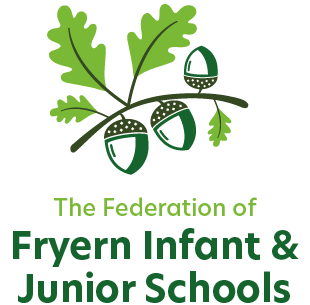Science
Science vision
Nothing in life is to be feared, it is only to be understood. Now is the time to understand more, so that we may fear less.” – Marie Curie
At Fryern Infant and Junior schools we believe that science should inspire our pupils to explore, discover and question. This will help secure the children with the foundations for understanding the world around them, whilst also developing a sense of excitement and curiosity.
Intent
We aim to deliver a stimulating science curriculum, giving all pupils the opportunities to explore, discover and question natural phenomena, and to develop a deeper understanding of the world we live in. We want to motivate and encourage our pupils’ natural curiosity and excitement, through meaningful and memorable learning experiences, that lead to a lifelong enthusiasm for science.
Implementation
Our science curriculum has been carefully planned in accordance with Early Years Framework and the National Curriculum where we aim to develop a secured science knowledge in every child. It is implemented through a careful sequencing of ‘Key Questions’, planned progression of skills and a growing scientific understanding, built through the disciplines of biology, chemistry and physics. Both substantive and disciplinary knowledge and skills will be gained through an enquiry approach to learning, with a focus on building on previous learning to deepen understanding. Using practical, hands-on approaches and real-life investigations supported by explicit teaching of substantive knowledge, pupils will develop their abilities to predict, observe, analyse and problem solve. This will enable them to critically evaluate and respect living organisms and the physical world around them, whilst equipping them with the scientific knowledge required to understand the uses and implications of science, today and for the future.
We aim to achieve this in the Early years by giving the children opportunities to explore the natural world by:
- Exploring the natural world around them, making observations and drawing pictures of animals and plants.
- Knowing some similarities and differences between the natural world around them and contrasting environments, drawing on their experiences and what has been read in class.
- Understanding some important processes and changes in the natural world around them, including the seasons and changing states of matter.
This is taught through:
- Exploration welly walks, where children are encouraged to learn about their environment, seasons (weather, colour and changes), states of matter (water, solid, liquid and gases) and animal and plant life.
- Curiosity cube where items are picked and explored with learning driven by questioning from the children
- Investigations linked to real life experiences stemming from the children’s interests.
These everyday activities introduce the children to science in a basic way which will be built upon in KS1.
In KS1 children will continue to use these scientific skills to undertake enquiry-based learning where they will explore:
- Plants
- Seasons
- Animal survival, life cycles and habitats
- Describing and Changing Materials
- Pushes and Pulls
The impact of our science curriculum will equip the children to be curious and ask questions, whilst developing their understanding of scientific ideas. They will also be able to use simple scientific language to communicate their ideas which will prepare them for KS2.
In KS2 children will continue to use these scientific skills to undertake enquiry-based learning where they will explore:
- Magnets
- Animals Skeletons and Movement
- States of Matter
- Light
- Rocks, Soil and Fossils
- Living things- Digestion and Circulation
- Electrical Circuits
- Sound
- Forces
- Plants
- Evolution
The impact of our Science curriculum in KS2 will enable the children to further develop a deeper understanding of a wide range of scientific ideas. This will be through selecting the most appropriate ways to answer science questions, noticing patterns, group and classifying things whilst also carrying out competitive and fair tests. Through this they will be able to draw conclusions using their own data and observations. This will be built on in KS3.









